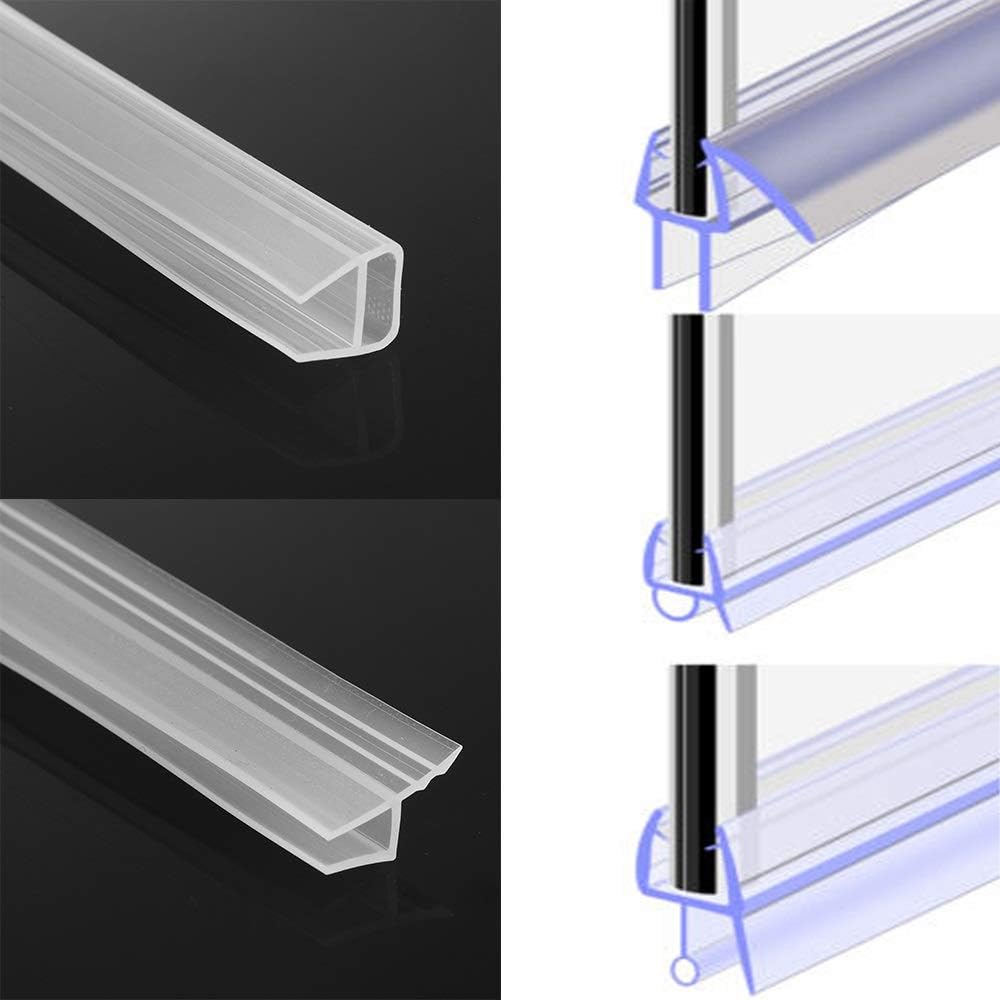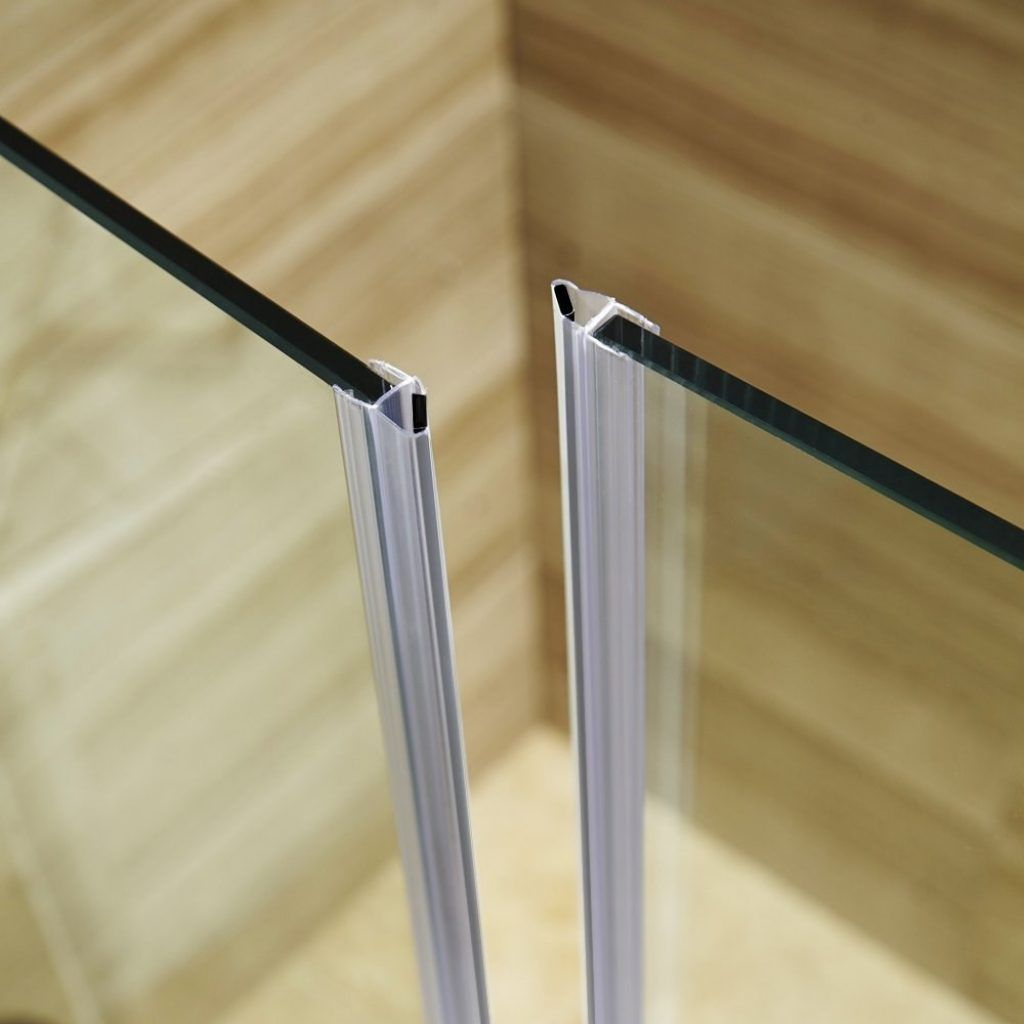Types of Bathroom Glass Door Seals

A bathroom glass door seal is an essential component for maintaining a watertight and functional shower enclosure. It prevents water from leaking out, ensuring a comfortable and dry bathroom environment. These seals come in various designs, each with unique characteristics, advantages, and disadvantages.
Rubber Seals
Rubber seals are the most common type of bathroom glass door seal, offering a balance of affordability, durability, and water resistance. They are typically made from flexible, resilient rubber materials, such as EPDM or neoprene, which can withstand the constant exposure to moisture and temperature changes in a bathroom.
Advantages of Rubber Seals
- Cost-effective: Rubber seals are generally the most affordable option compared to other types of seals.
- Durable: They are designed to withstand wear and tear, offering long-lasting performance.
- Water-resistant: Rubber seals effectively prevent water leakage, ensuring a dry bathroom environment.
- Easy to install: Many rubber seals are self-adhesive, simplifying the installation process.
Disadvantages of Rubber Seals
- Susceptible to wear and tear: Over time, rubber seals can become brittle, cracked, or discolored due to exposure to moisture and UV rays.
- Limited aesthetic appeal: Rubber seals can sometimes have a less polished appearance compared to other seal materials.
- Potential for mildew growth: The porous nature of rubber can create a breeding ground for mildew if not properly cleaned and maintained.
Examples of Rubber Seal Designs
- U-shaped seals: These are common for bottom seals, providing a tight fit against the shower floor.
- Bulb seals: Bulb seals are often used for top and side seals, offering a flexible and water-resistant barrier.
- Magnetic seals: Some rubber seals incorporate magnets for a secure and watertight closure, typically found in frameless shower doors.
Silicone Seals
Silicone seals offer a superior level of water resistance and durability compared to rubber seals. They are made from silicone rubber, a synthetic material known for its flexibility, heat resistance, and resistance to chemicals and UV rays.
Advantages of Silicone Seals
- Excellent water resistance: Silicone seals are highly water-resistant, making them ideal for preventing water leakage in showers.
- Durable and long-lasting: Silicone seals are resistant to mold, mildew, and UV degradation, ensuring long-term performance.
- Easy to clean: Silicone is a smooth, non-porous material that is easy to clean and maintain.
Disadvantages of Silicone Seals
- Higher cost: Silicone seals are typically more expensive than rubber seals.
- Can be difficult to install: Some silicone seals require specialized tools and techniques for installation.
- Potential for staining: Silicone can be susceptible to staining from certain cleaning products.
Examples of Silicone Seal Designs
- Clear silicone sealant: This is a common option for sealing gaps around shower doors and walls.
- Pre-formed silicone seals: These are available in various shapes and sizes, designed to fit specific door configurations.
- Silicone strips: Silicone strips are often used for bottom seals, offering a durable and water-resistant barrier.
Magnetic Seals
Magnetic seals are a unique type of seal that utilizes magnets to create a secure and watertight closure. They are typically found in frameless shower doors, offering a sleek and modern aesthetic.
Advantages of Magnetic Seals
- Sleek and modern appearance: Magnetic seals create a clean and minimalist look, enhancing the aesthetic appeal of frameless shower doors.
- Strong and secure closure: The magnetic force ensures a tight seal, preventing water leakage.
- Easy to operate: Magnetic seals are simple to use, requiring only a gentle push or pull to open and close the door.
Disadvantages of Magnetic Seals
- Higher cost: Magnetic seals are generally the most expensive type of seal.
- Potential for misalignment: If the magnets are not properly aligned, the seal may not be effective.
- Limited durability: Magnetic seals can be more susceptible to damage from impact or heavy use.
Examples of Magnetic Seal Designs
- Magnetic strips: These are typically used for side seals, providing a secure and watertight closure.
- Magnetic catches: Magnetic catches are often used for bottom seals, offering a strong and secure closure.
Importance of Bathroom Glass Door Seals

Bathroom glass door seals play a crucial role in maintaining a comfortable and functional bathroom environment. They act as a barrier against water leakage, preventing water from escaping the shower area and causing damage to surrounding surfaces.
Water Leakage Prevention
These seals effectively prevent water from escaping the shower area by creating a tight seal around the glass door. They help maintain a clean and dry bathroom environment by preventing water from splashing onto the floor, walls, and surrounding fixtures. This significantly reduces the risk of water damage, mold growth, and slippery surfaces, contributing to a safer and more hygienic bathroom experience.
Energy Efficiency
Bathroom glass door seals also contribute to energy efficiency by minimizing drafts and heat loss. They create a barrier that prevents warm air from escaping the shower area, reducing the need for excessive heating and contributing to lower energy consumption. This is particularly beneficial in colder climates, where maintaining a comfortable bathroom temperature can be challenging.
Potential Problems Associated with Damaged or Missing Seals, Bathroom glass door seal
Damaged or missing bathroom glass door seals can lead to various problems, negatively impacting the functionality and aesthetics of the bathroom.
- Water Damage: Damaged seals allow water to escape the shower area, leading to water damage to the floor, walls, and surrounding fixtures. This can result in costly repairs and replacements, as well as potential health risks associated with mold growth.
- Mold Growth: Water leakage caused by damaged seals can create a damp environment, promoting mold growth. Mold can pose health risks, especially for individuals with allergies or respiratory problems.
- Increased Cleaning Requirements: Water escaping the shower area due to damaged seals can lead to increased cleaning requirements. The constant presence of water on the floor and surrounding surfaces necessitates more frequent cleaning to maintain a clean and hygienic bathroom environment.
- Aesthetic Issues: Damaged seals can also affect the aesthetic appeal of the bathroom. They can become discolored, cracked, or torn, detracting from the overall look and feel of the bathroom.
Selecting the Right Bathroom Glass Door Seal

Choosing the right bathroom glass door seal is crucial for ensuring a smooth, leak-proof, and long-lasting shower experience. This involves considering a range of factors, including the type of door, its size, and the installation method.
Factors to Consider When Selecting a Bathroom Glass Door Seal
The selection process involves assessing various aspects of the bathroom glass door seal, such as the material, shape, and thickness.
- Material: The material of the seal is a key factor in its durability, resistance to water, and longevity. Common materials include rubber, silicone, and vinyl. Rubber seals are durable and resistant to high temperatures, making them suitable for steamy bathrooms. Silicone seals are flexible, waterproof, and easy to clean, while vinyl seals are affordable and available in various colors.
- Shape: The shape of the seal should match the profile of the glass door and the shower enclosure. Common shapes include U-shaped, D-shaped, and rectangular. U-shaped seals are suitable for standard glass doors, while D-shaped seals are better for curved doors. Rectangular seals are often used for shower enclosures with fixed panels.
- Thickness: The thickness of the seal affects its ability to seal effectively against water leaks. Thicker seals are generally more effective at preventing leaks, but they can be more difficult to install.
Types of Bathroom Glass Door Seals
Bathroom glass door seals come in various types, each designed for specific door types and installation methods.
- Magnetic Seals: Magnetic seals are commonly used for frameless glass shower doors. They consist of a magnetic strip attached to the door and a corresponding strip attached to the shower wall. The magnetic force keeps the door closed and prevents water leaks.
- Compression Seals: Compression seals are typically used for framed glass doors. They are made of rubber or vinyl and are compressed against the door frame to create a watertight seal.
- Sweep Seals: Sweep seals are designed to prevent water from running down the glass door and into the bathroom. They are often used in combination with other types of seals.
Popular Brands and Products
Several brands offer high-quality bathroom glass door seals. Some popular options include:
- Moen: Moen is a well-known brand known for its reliable and durable bathroom products, including glass door seals. They offer a range of seals for different door types and installation methods.
- Delta: Delta is another reputable brand that offers a variety of high-quality bathroom glass door seals. Their products are known for their durability and water resistance.
- Kohler: Kohler is a leading brand in bathroom fixtures and accessories, including glass door seals. They offer a wide selection of seals designed to meet various needs.
Replacing that worn-out bathroom glass door seal is a priority, but first, I need to figure out why my dog is suddenly obsessed with the bathroom door. I’ve heard theories about wanting to be near their humans, or maybe they’re just curious about what’s going on in there.
I’ll have to check out this article why do dogs wait by the bathroom door for some answers before tackling that leaky seal.
A worn-out bathroom glass door seal can lead to leaks and drafts, but it can also create a frustrating situation if the door gets stuck shut! If you ever find yourself locked out of your own bathroom, you might need to learn a few tricks to get back in.
Thankfully, there are some simple solutions for getting in a locked bathroom door, like using a credit card or a bobby pin. how to get in a locked bathroom door Once you’re back inside, don’t forget to replace that old seal to avoid future lockouts and keep your bathroom comfortable and dry.
